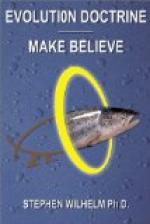The first is the conception of infinite personalities that later become more or less merged into one supreme being. This begins with the idea of the soul as the human ego, conventionally regarded as something independent of the material body during life and immortal after death. The savage goes to sleep, and in his dreams he goes upon journeys and battles strenuously with other men and with beasts, only to find when he awakes that his body is not fatigued, and that it has not really taken part in the activities of his dream life. His companions about the fire also tell him that this is so, while he is equally sure that his essential self has been doing many things during the interval of sleep. In his dream life he finds himself joined by others whom he knows are dead. He sees again even those whose bodies he may have assisted in eating. His total world very soon comes to have an unseen region which is the abode of ordinarily invisible beings having the forms of men, with whom his own dream person can associate; this unseen sphere is furnished also with ghostly counterparts of the trees and rocks and waters with which he is familiar when he is awake. Before long his soul or ghost or spirit is conceived as something which possesses two qualities: it can be disassociated from his body and enter the spirit-world where it seems to defy all the laws of waking life, for with the quickness of thought it visits neighboring islands as readily as it passes to the next hut; and it possesses immortality, for it is exactly like the persistent spirit-individualities of those who have died before him. The other cause for the development of the conception of gods and God in the mind of the savage is the fact that things have been made which neither he nor any other man can make. He can dig a ditch, and make a house, and fashion a canoe, and build ramparts of earth; but human power has obviously been insufficient to construct rivers and mountains and forests and their denizens. Mankind itself has certainly been made in some way, for it exists. Because the savage cannot conceive of things being made excepting as they are made by the human hand, and because so much confronts him that is beyond the power of human construction, he comes to postulate the existence of man-like, but greater than human, personalities, and as he cannot see them in the light of day, they belong to the spirit-world to which souls go. Imagination sometimes gives human outlines to shadows among the moon-lit trees, so that elves and pixies, nymphs and fairies, become established in the world as the primitive man conceives it. Larger tasks are discharged by more important spirits, and everything natural thus becomes animated by supernatural beings. Thor was the god of thunder; Freia the goddess of spring and vernal awakening; Athena inspired the minds of men. Venus and Aphrodite played their special parts, also. But such powers as these, established by the untutored mind, needed to be accounted for, and so in the more advanced religions Jove and Jupiter were created as the more ultimate causes, in response to intellectual demands. By combining all powers into one, God and Brahma are the results.




